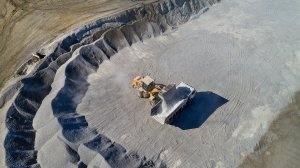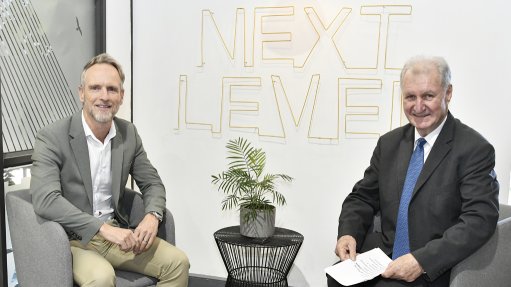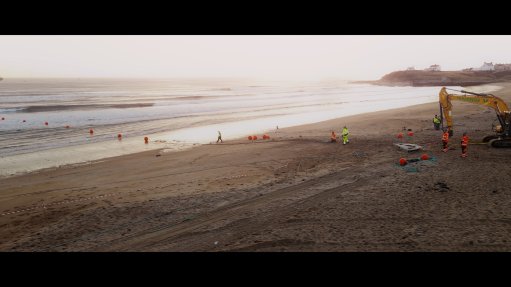Afrimat unpacks how its recent acquisitions are settling in

Afrimat executives unpack the company's diversification strategy and how new acquisitions are settling in. Video and editing: Nicholas Boyd
JSE-listed midtier miner Afrimat on August 5, during an investor day, outlined its expectations on when its latest acquisitions will start contributing to the group’s results, as well as how the company will go about driving growth going forward.
Most of the acquisition activity in the financial year ended February 28, and to date, has been in the company’s bulk commodities segment.
Afrimat’s other segments are construction materials and industrial minerals.
Afrimat first diversified into bulk commodities – iron-ore – in 2015.
While the Demaneng iron-ore mine, in the Northern Cape, has about four years of mine life left at an 870 000 t/y production capacity, the Jenkins iron-ore mine that was recently brought online is on track to reach its 500 000 t/y production capacity during its first year of operation.
The 20-year Jenkins mine, in the Northern Cape, will start contributing to the company’s financial results in the second half of the 2022 financial year, and is poised to boost revenues further once it ramps up to a 1.2-million-tonne-a-year production capacity in its second year running.
CEO Andries van Heerden told investors the company would need to spend R110-million to get the mine to full production, including building a crushing plant on site, instead of using the present mobile crushers.
The Driehoekspan and Doornpan iron-ore mines, in the Northern Cape, as part of Afrimat’s Coza Mining acquisition – finalised in September 2020 – will, meanwhile, be brought online before the Demaneng mine life runs out, he added.
He pointed out that the Jenkins mine had a six- to ten-year mine life, while the Doornpan and Driehoekspan operations would contribute another ten years of mine life.
The company will soon turn its iron-ore focus to local product supply agreements, particularly to primary steel producer ArcelorMittal South Africa, more so than the export market, which the Demaneng mine remains solely focused on.
Meanwhile, the Nkomati anthracite mine, in Mpumalanga, which Afrimat acquired in October last year, will reach a 225 000 t/y production capacity by the end of the 2022 financial year, before ultimately ramping up to steady-state capacity of 540 000 t/y.
The mine will focus on supplying the domestic market and currently has an inferred mine life of 20 years, while measured mine life comes to seven years.
The newest addition to Afrimat’s portfolio, the Gravenhage manganese mining right, in the Northern Cape, will be developed for the export market and start contributing to financial results in the 2023 financial year. The project has a projected 15-year mine life.
South Africa has 80% of the world’s known high-grade manganese ore reserves, located in the Kalahari Manganese Field, in the Northern Cape. It is used in steel and iron production, clear glass manufacturing, to boost octane ratings in gasoline and in cathode dry cell batteries.
Van Heerden said the company eagerly embraces acquisition opportunities because of the value creation enhancement it offers.
Afrimat has an entrenched diversification strategy to enable strong cash generation, and the company’s growth has always been funded from cash reserves.
Business development head Grant Dreyer explained that Afrimat’s business development process is underpinned by new acquisitions, product development in the existing portfolio and optimisation of current processes.
“The company relentlessly pursues value creation by continuously scanning the environment and maintaining a strong understanding of the company’s capabilities, as well as ensuring an inclusive process – leveraging a broad knowledge base within the company and externally.
“Afrimat’s new business process includes strategy formulation, strategic assessment, negotiation, due diligence and financial modelling.
“The successful conclusion of an acquisition depends on price, competitive advantage, capability and teamwork,” Dreyer noted.
Afrimat prefers to pursue opportunities that are able to provide sustainable earnings right through a commodity cycle, and have inherent competitive advantage, with good market dynamics and expansion prospects.
All the while the company keeps mind of trends in logistics, energy, technology and decarbonisation.
The company first ventured into industrial minerals as part of its diversification strategy, further to its base construction materials business, which Van Heerden said both still pose growth opportunities in their own right.
The industrial minerals segment supplies the steel industry with metallurgical dolomite, the construction industry with a variety of aggregate products and the agricultural industry with agricultural lime.
The company also supplies niche markets with its industrial mineral products, including chemicals, glass, paint, alternative building and animal feed products.
Industrial minerals MD Andrew Wray enthused that this business segment is looking at additional kiln capacity at the Vredendal operation, in the Western Cape, to broaden market penetration, as well as an upgrade of primary plant infrastructure at its oldest operation, Langvlei, in the Western Cape.
Although the bulk commodities and industrial minerals segments of the company have proven to have more opportunities for expansion and growth, all is not lost for the construction materials segment despite a depressed market environment, said Van Heerden.
Construction materials north cluster MD Davin Giles said demand remains stable, and that the company was seeing increased spend in rural areas through merchants, as well as more South African National Roads Agency Limited tenders advancing.
The north cluster is reviewing opportunities for recycling of aggregates, such as slag.
Construction materials south cluster MD Anton Barnard added that the construction materials medium-term order book and future tender work looks promising.
Lastly, human resources and sustainability head Collin Ramukhubathi shared that the company would soon announce its goals and action steps around carbon neutrality.
Article Enquiry
Email Article
Save Article
Feedback
To advertise email advertising@creamermedia.co.za or click here
Comments
Press Office
Announcements
What's On
Subscribe to improve your user experience...
Option 1 (equivalent of R125 a month):
Receive a weekly copy of Creamer Media's Engineering News & Mining Weekly magazine
(print copy for those in South Africa and e-magazine for those outside of South Africa)
Receive daily email newsletters
Access to full search results
Access archive of magazine back copies
Access to Projects in Progress
Access to ONE Research Report of your choice in PDF format
Option 2 (equivalent of R375 a month):
All benefits from Option 1
PLUS
Access to Creamer Media's Research Channel Africa for ALL Research Reports, in PDF format, on various industrial and mining sectors
including Electricity; Water; Energy Transition; Hydrogen; Roads, Rail and Ports; Coal; Gold; Platinum; Battery Metals; etc.
Already a subscriber?
Forgotten your password?
Receive weekly copy of Creamer Media's Engineering News & Mining Weekly magazine (print copy for those in South Africa and e-magazine for those outside of South Africa)
➕
Recieve daily email newsletters
➕
Access to full search results
➕
Access archive of magazine back copies
➕
Access to Projects in Progress
➕
Access to ONE Research Report of your choice in PDF format
RESEARCH CHANNEL AFRICA
R4500 (equivalent of R375 a month)
SUBSCRIBEAll benefits from Option 1
➕
Access to Creamer Media's Research Channel Africa for ALL Research Reports on various industrial and mining sectors, in PDF format, including on:
Electricity
➕
Water
➕
Energy Transition
➕
Hydrogen
➕
Roads, Rail and Ports
➕
Coal
➕
Gold
➕
Platinum
➕
Battery Metals
➕
etc.
Receive all benefits from Option 1 or Option 2 delivered to numerous people at your company
➕
Multiple User names and Passwords for simultaneous log-ins
➕
Intranet integration access to all in your organisation


















